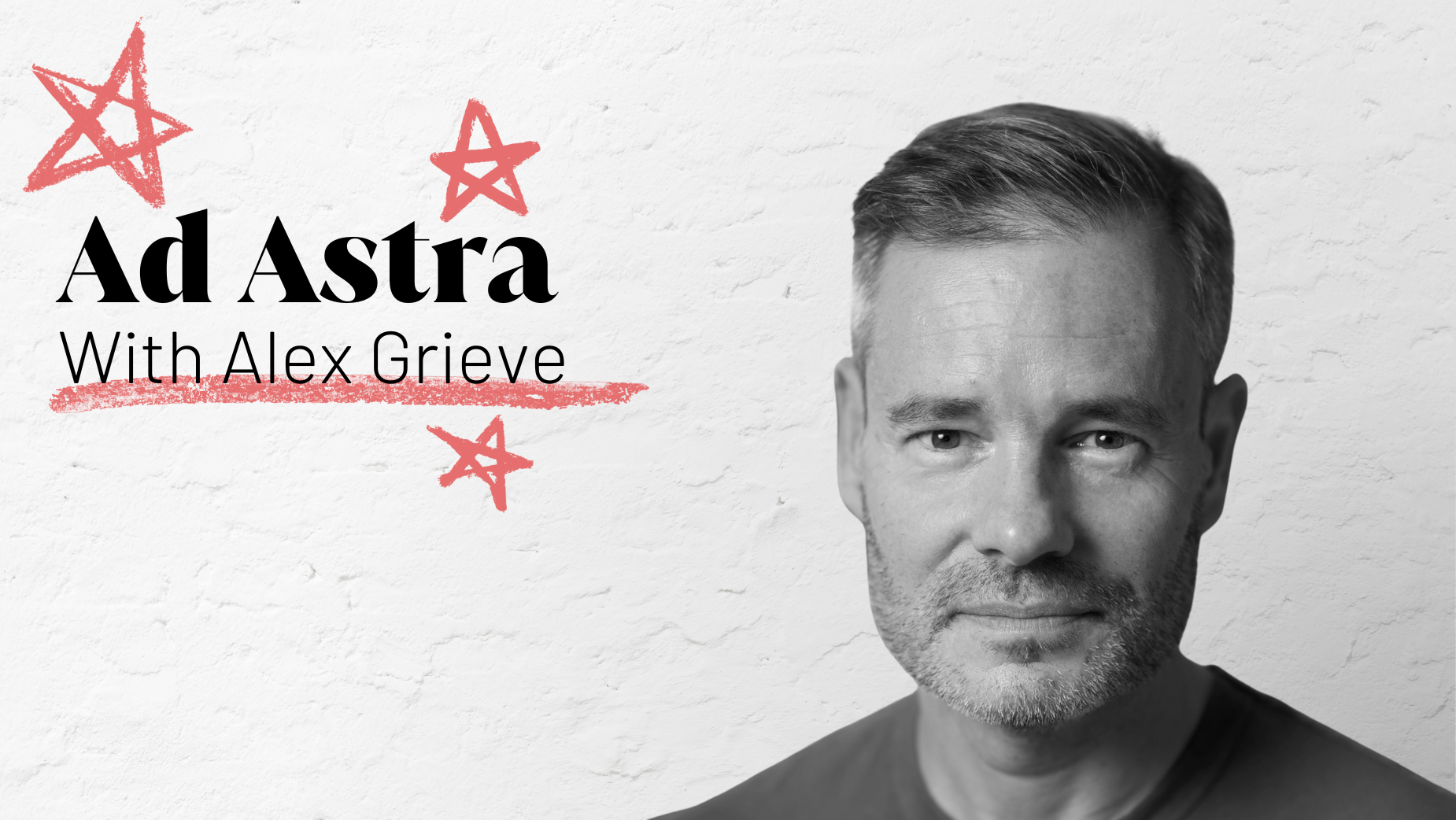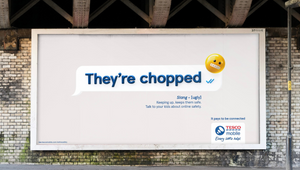
Ad Astra: Reading Into Creativity with Alex Grieve

Alex Grieve was the kind of kid who would much rather spend his pocket money on a book than a single. Even today he’ll usually have two or three books on the go at once, finding “great joy and comfort” in reading - but as a child he found it an escape. As someone who was quite shy and introverted, he took solace in the imaginary worlds he read and wrote about.
Advertising wasn’t on Alex’s radar until much later in life. But his enduring passion for the written word and a transient and somewhat scattered childhood perhaps set him up rather well for a career in an industry whose currency is change.
“I’ve had quite a weird, interesting, sometimes conservative, sometimes bohemian upbringing, where I’ve flitted between various parents. Bizarrely, although it sounds completely chaotic, it’s actually semi-functional and quite happy with all these different groups,” says Alex. He explains that his parents split up when he was just three months old and each remarried three times, meaning that his childhood was split between several families and he was exposed to an array of lifestyles - and that’s before you factor in all of the hundreds of other worlds he got to experience through his books.
With his filmmaker father and his cupboard full of European arthouse films, he was given an exceptional education in cinema; for the four years he spent living in the Seychelles, he was wild and happy and free. Moving around, switching schools engendered a sort of resilience and self-sufficiency that formed a solid foundation for his future career.
As he grew up, that love of reading and writing solidified. In secondary school and university, where he studied politics with English, he harboured ambitions of becoming a political speechwriter and then journalist. After university, he taught English in Japan in a small town near Nagoya, where he was one of a handful of foreigners, and took the Trans-Siberian railway home, landing in Berlin just after the fall of the Berlin Wall.
On his return to the UK, Alex worked at Channel 4 as a researcher for a few years - but when the show he was working on wasn’t recommissioned, he suddenly found himself at a loose end. As it happened, his mum was friends with an adland headhunter, a lady who Alex describes as ‘an Absolutely Fabulous figure from the 1960s’. Despite having very little interest in advertising, Alex decided to go to meet her. She explained that she had lots of art directors looking for writers to work with. She took the first CV off a huge pile of them and handed it to him. And that’s how Alex met Adrian Rossi, the man who would be his creative partner for over two decades.
They met for a beer and all Alex had to offer by way of writing examples were some short stories, so the pair spent the next three months putting together a book. The pair managed to bag a placement at Saatchi & Saatchi (“It was very wild and quite anarchic,” recalls Alex), but thanks to the sluggish early ‘90s economy, it took 15 months to turn that placement into a permanent role.
Alex’s lack of experience or formal training was both a blessing and a curse. He had no baggage tying him to convention but he also didn’t have any conception of what ‘good’ really looked like. “It meant, as a young team, we were very ‘shit or bust’,” he says. “There’d be either something quite weird, because it was different, or something that was really bad, but there was very little in the middle. I think just doing that does make you stick out. When we were good, we were very good and when we were bad, it was pretty woeful.”
Thankfully, this was a time when there was the time and resource to really train and support young talent. Alex recalls working almost as an apprentice, shadowing the likes of Bill Gallagher, Richard Myers, Ed Robinson and Dave Hilliard who would take the time to look at their copy, draw lines through it and explain where they were going wrong.
There was, he reflects, more cash flowing around.
“Because everything is sped up and things are leaner, junior teams have less time from senior people to help them get better. It still exists but it’s not as hands-on as it was,” he says. What’s more, young creatives also have to get their heads around a cornucopia of different disciplines and media, whereas previously they’d have print, poster, radio and TV.
“It’s like, if you make chairs for 20 years, you’re going to be really good at making chairs at the end of it. What’s different now is that teams coming in are not only expected to be really good at making those chairs, but you [also] have to put in the wiring and the plumbing and put the roof on and do the glazing… There’s so much and that’s really exciting, because an idea can literally go anywhere. [But] you don’t have that repetition of doing the same thing again and again and again and again. It just makes you really good at it.”
These days, of course, we’re on the cusp of an industry where juniors don’t need to pour their time into those mundane, repetitive tasks, thanks to AI. Alex recalls being tasked with working on Pampers adaptations, which he describes as a ‘dull but safe environment to make mistakes and learn building blocks’. He certainly sees the utility in AI as a tool, but when he thinks about its impact on training he says it’s a ‘conundrum’.
As a junior creative team, however, Alex and Adrian had no such worries. Particularly when they got to their next gig, at BBH, which he sees as his ‘alma mater’. “It was kind of like the University of Advertising, because the rigours and processes that Hegarty and everyone set up. There was such a striving for excellence that when you operate in that system for a long time, you can go anywhere. You’ve just been brilliantly trained.”
That stringent training was second to none, but Alex is ambivalent about his memories of BBH. “I’ve spoken about this before, so it’s not a revelation and hopefully not upsetting anyone, but I’ve said at the end of 14 years at BBH I was quite burnt out and ready to leave because that culture of excellence was all-consuming as well.”
Now he’s back as global CCO after an 11 year break, where he’s found the culture evolved. “It’s still got that striving for creativity, but it’s changed as well. It’s not quite as intense. It seems a bit kinder,” he says. He’s full of praise for the current leadership of Karen Martin, Simon Gregory, Will Lion, Holly Ripper and Stephen Ledger-Lomas.
In the intervening years, Alex was, of course, at AMV BBDO, where he and Adrian’s career really took off. Although he’d never been particularly driven to collect job titles, a string of successful campaigns put the spotlight on the pair and they found themselves being offered the role of ECD.
“I would say that ECD and CCO wasn’t something I was ever particularly looking for. It more occasionally found me. It’s back to that thing of being a kid who liked to escape into books. I was at my happiest sitting in an office, thinking of ideas and then going and making those ideas,” he says.
When Alex and Adrian made the decision to take that step up, they deliberately decided to really think about the leaders and managers they’d worked under. “We just did a really simple thing of looking at all the things people who we had worked for did - and we’d worked for some amazing people. That was the gift we were given. You take the bits you like and ignore the bits you don’t. From BBH, we took that striving for excellence and tried to marry it with some of the cultural things of AMV around Peter Mead’s ‘if in doubt be nice’.”
Ultimately for Alex, creative leadership is about facilitating and supporting. “It’s about you creating the conditions so that other people can express their creativity and come up with their answer, not your own answer, “ he says.
It’s a very empathetic leadership style that Alex has, and that’s why he does advise newly promoted ECDs and CCOs to try and keep hands on with the creative projects for as long as they can. “Firstly it’s a really exciting part of the job, and you get fulfilment and that makes you better at your job. The second thing is it reminds you of how hard it is, so you therefore have more empathy for the teams who are doing it.”
That empathy also extends to how Alex approaches feedback. It’s another area, he reflects, where the industry typically doesn’t do much training. In his experience, it’s best to tailor your feedback style to individuals, recognising who needs a gentle touch and who doesn’t ‘want any fucking around’.
His other insight into feedback and critiquing ideas is one that he heard from a fellow creative director. “You should always leave an idea on the table longer than you’re comfortable with, especially if it’s something you’re not quite sure about. Sometimes these things can suddenly become something amazing. We do sometimes just let go of things too quickly,” he says, before adding, “It’s always nuanced. On the other hand, there are some ideas that are so bad you need to just kill them because you’re just wasting time.”
Being able to navigate that boundary between unsettling potential genius and bad comes down to an instinct that’s been honed over ‘thousands of hours looking at thousands and thousands of ideas’. It’s instinct based on experience, and something that, in today’s hasty, time-crunched environment, isn’t always given the space it needs to develop. He expresses concern that sometimes the push to promote too early can leave creative leaders without that skill. But perhaps the most important skill that a creative leader can develop is the confidence to be comfortable enough to say, “I don’t know” when it comes to raw ideas.
As a creative leader, working with teams and developing talent is just one side of the equation. Alex reflects that he’s been fortunate to work with some great clients at both AMV BBDO and now at BBH, the likes of Guinness, Essity, Tesco and Burger King. Looking at the industry more broadly, however, he sees a reticence and risk aversion among marketers.
“If you could boil the success of advertising down to one thing, the single most important thing is a great client. I know it sounds obvious but if you have a great client you can do anything. I don’t think it’s due to a lack of talent. It’s just that there aren’t enough great clients who are buying,” he says. “The great insight that great clients have… is that they realise the real risk is being vanilla. Because otherwise you’re just pumping out all these dollars into the world around stuff that people don’t give a shit about. They just instinctually have that good taste.”
That’s something he’s experienced working with Tesco, the UK’s biggest supermarket chain. The work, he says, is driven by business need and informed by a joint belief in what that work needs to be in order make an impact. “You’re never starting from a point of putting interesting work into the world for interesting’s sake or to win awards. You’re starting by genuinely asking how we can shift their business and make the work more effective. It’s a proper partnership because it’s based on business responsibility, as dry as it sounds, so you’re both doing it for the right reasons. And there’s a belief that to get that, you have to do something that’s actually going to get people’s attention or push some sort of boundary, to create a reaction or properly understand the heartbeat of the nation.”
Although Alex says that he’s feeling a lot more optimism from clients than he’s seen in recent years, he’s also got a lot of empathy for marketers and the enormous array of factors and duties they have to juggle. “Sometimes we fail to get that advertising is only one small part of what they do. So again, it’s that empathy, being able to empathise with all the struggles that they’re under,” he says. “You try to make yourself as useful as possible, to take a lot of stuff off them and to make the work effective.”
All that experience observing good clients up close is proving to be useful given Alex’s current side hustle. He’s been busy working on developing his own cycling apparel brand. The hope is to take advantage of the tech advances of new fabrics and create designs more unique than the samey mid-range kit that’s already out there. He’s approaching it brand-first, a process he’s really enjoying.
For Alex, running and cycling are an important release and, if not a direct part of his creative process, certainly something that keeps him match-fit. “I don’t think I’ve ever had an idea on a run or a cycle, I’m normally too tired. For me, it does a couple of things. Firstly, it’s kind of like my Prozac. It’s the thing that helps me destress, so I enjoy that process. But there’s also the thing, without sounding like I’m patting myself on the back, is there’s a kind of discipline involved in running. Just doing it day after day when you don’t want to do it, get out of bed and do it. I find that when I’m in a good pattern of doing fitness, it feeds into my work.”
Exercise isn’t the only fuel that fires Alex’s creativity, of course. When we talk he’s reading a book on the Troubles in Northern Ireland, sweeping road novel The Lincoln Highway by Amor Towles, and another book by the Irish literary great Kevin Barry. Those little windows into different lives, minds, and parts of the world that he’s been peeping through since childhood have, over time, helped Alex to build that empathy and insight that have made him the creative leader he is today.












